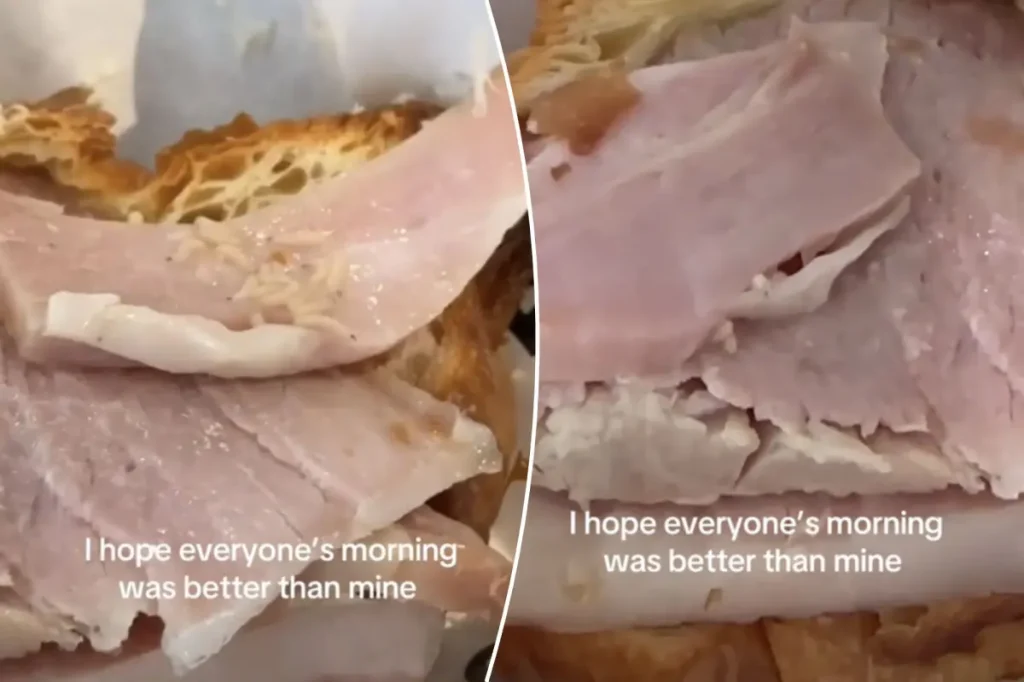A Cafe’s Maggot Crisis: How a Routine Breakfast Became a Viral Nightmare
In the heart of Adelaide Hills, what should have been a simple breakfast stop turned into a stomach-churning ordeal when a customer discovered live maggots crawling inside her ham and cheese croissant from POT cafe in Hahndorf. The incident, captured on TikTok by user @lillylimeys, quickly amassed three million views and thrust both the customer and the small Australian cafe into an unexpected spotlight. The disturbing footage showed tiny white larvae wriggling through the layers of what should have been a delicious morning pastry. “I hope everyone’s morning was better than mine,” she wrote over the video, understating what must have been a horrifying discovery. The customer had already taken a bite before noticing the unwelcome additions, making the situation even more distressing.
The immediate aftermath was a flurry of social media reactions, with commenters expressing visceral disgust and empathy. “Call me dramatic, but I would never eat again,” wrote one user, while another admitted, “I would actually die on the spot.” Beyond the expected revulsion, the incident raised serious health concerns. Maggots, which are fly larvae, can cause bacterial poisoning if consumed because they typically thrive in spoiled food and can carry harmful microorganisms like Salmonella and E. coli. After discovering the infestation, the customer contacted the cafe through Instagram, sharing the video evidence. According to screenshots she later posted, the cafe’s initial response was surprisingly casual – they apologized, blamed “bloody flies,” and promised a refund. This seemingly nonchalant attitude toward such a serious food safety breach only intensified the customer’s concern, prompting her to contact the Mount Barker Council, which confirmed they were investigating the matter.
The cafe’s first public apology, posted on Instagram Wednesday afternoon, struck many as insufficient and tone-deaf. The statement characterized the incident as a “one-off mishap” and a “viral moment,” suggesting the cafe provided quality service “99.99999 percent of the time.” This response appeared to minimize the severity of finding live insects in food, a significant health code violation by any standard. The dismissive nature of this initial apology only fueled further criticism, with many commenters pointing out that maggots in food isn’t merely an “oopsie” but a major health risk that deserved to be addressed with appropriate gravity. The customer herself noted she still hadn’t received her promised refund or what she considered an adequate apology despite the cafe’s public statement.
In a follow-up video, the customer provided more details about the disturbing moment. “I picked up a piece of meat and I eat it and I look down and I see a little wiggly thing on my hand. I then spat it out and ran outside and started gagging,” she recounted. Despite the traumatic experience, she emphasized that her goal wasn’t to “take them down” but rather make them “own up to their mistakes” and understand “how serious this actually is.” This measured response demonstrated remarkable restraint given the circumstances, focusing on accountability rather than revenge. Meanwhile, the council investigation loomed, with potential consequences including fines, improvement notices, or prosecution if breaches of the Food Act 2001 were found – serious ramifications for any small business.
Recognizing the inadequacy of their first response, the cafe owner posted a second, more heartfelt apology on Thursday morning. Signed by “Winnie,” this message struck a markedly different tone, asking readers to approach with “an open heart and mind” while accepting “full responsibility” and acknowledging “the severity of what has occurred.” The owner explained that the previous post had been written with help when she was too devastated to write it herself, but admitted she “should have screened it further.” In this more personal message, Winnie revealed that she had “gone against my gut feeling and provided pre-prepared food and left it out in an open-air environment,” acknowledging she knew “there was a risk of flies as my windows and doors are open.” This honest admission of flawed business practices demonstrated a level of transparency absent from the initial response.
This incident serves as a stark reminder of how quickly a small mistake can escalate into a business crisis in today’s interconnected world. The cafe owner’s pledge to cease offering pre-prepared food represents a tangible business change resulting directly from this incident. “I succumbed to the pressure of having quick grab-and-go food available when I was not on site, and for succumbing to that pressure I am so p*ssed off at myself,” the owner confessed. The emotional conclusion – “Wholeheartedly broken, Winnie” – humanizes what began as a corporate-sounding dismissal. What remains unclear is whether this more authentic apology, the business changes, and the eventual resolution of the council investigation will be enough to rebuild customer trust and save a small business from a single, albeit serious, food safety lapse. The incident highlights the delicate balance between convenience and safety in food service, the power of social media to amplify consumer experiences, and how the response to a crisis can often matter as much as the crisis itself.


